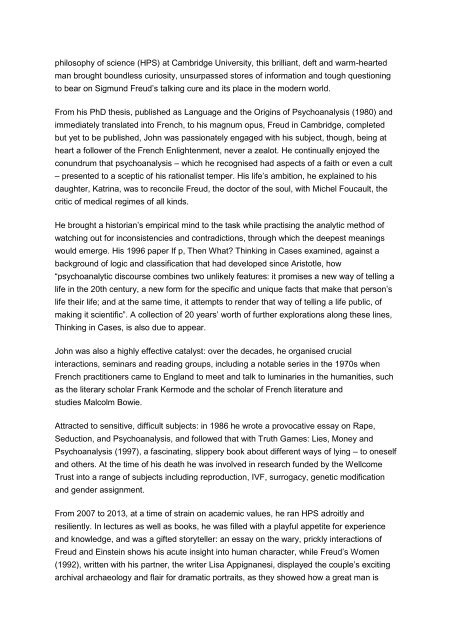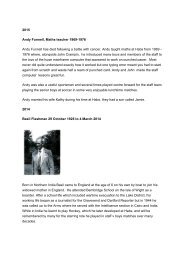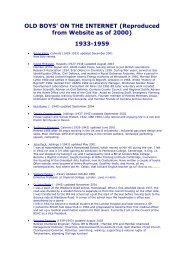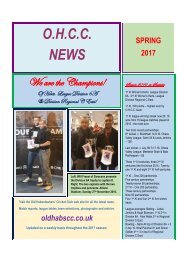Obituaries
You also want an ePaper? Increase the reach of your titles
YUMPU automatically turns print PDFs into web optimized ePapers that Google loves.
philosophy of science (HPS) at Cambridge University, this brilliant, deft and warm-hearted<br />
man brought boundless curiosity, unsurpassed stores of information and tough questioning<br />
to bear on Sigmund Freud’s talking cure and its place in the modern world.<br />
From his PhD thesis, published as Language and the Origins of Psychoanalysis (1980) and<br />
immediately translated into French, to his magnum opus, Freud in Cambridge, completed<br />
but yet to be published, John was passionately engaged with his subject, though, being at<br />
heart a follower of the French Enlightenment, never a zealot. He continually enjoyed the<br />
conundrum that psychoanalysis – which he recognised had aspects of a faith or even a cult<br />
– presented to a sceptic of his rationalist temper. His life’s ambition, he explained to his<br />
daughter, Katrina, was to reconcile Freud, the doctor of the soul, with Michel Foucault, the<br />
critic of medical regimes of all kinds.<br />
He brought a historian’s empirical mind to the task while practising the analytic method of<br />
watching out for inconsistencies and contradictions, through which the deepest meanings<br />
would emerge. His 1996 paper If p, Then What? Thinking in Cases examined, against a<br />
background of logic and classification that had developed since Aristotle, how<br />
“psychoanalytic discourse combines two unlikely features: it promises a new way of telling a<br />
life in the 20th century, a new form for the specific and unique facts that make that person’s<br />
life their life; and at the same time, it attempts to render that way of telling a life public, of<br />
making it scientific”. A collection of 20 years’ worth of further explorations along these lines,<br />
Thinking in Cases, is also due to appear.<br />
John was also a highly effective catalyst: over the decades, he organised crucial<br />
interactions, seminars and reading groups, including a notable series in the 1970s when<br />
French practitioners came to England to meet and talk to luminaries in the humanities, such<br />
as the literary scholar Frank Kermode and the scholar of French literature and<br />
studies Malcolm Bowie.<br />
Attracted to sensitive, difficult subjects: in 1986 he wrote a provocative essay on Rape,<br />
Seduction, and Psychoanalysis, and followed that with Truth Games: Lies, Money and<br />
Psychoanalysis (1997), a fascinating, slippery book about different ways of lying – to oneself<br />
and others. At the time of his death he was involved in research funded by the Wellcome<br />
Trust into a range of subjects including reproduction, IVF, surrogacy, genetic modification<br />
and gender assignment.<br />
From 2007 to 2013, at a time of strain on academic values, he ran HPS adroitly and<br />
resiliently. In lectures as well as books, he was filled with a playful appetite for experience<br />
and knowledge, and was a gifted storyteller: an essay on the wary, prickly interactions of<br />
Freud and Einstein shows his acute insight into human character, while Freud’s Women<br />
(1992), written with his partner, the writer Lisa Appignanesi, displayed the couple’s exciting<br />
archival archaeology and flair for dramatic portraits, as they showed how a great man is





